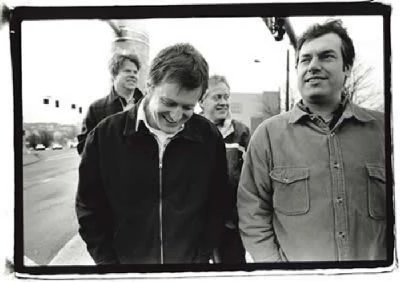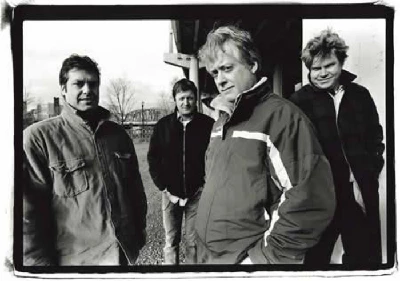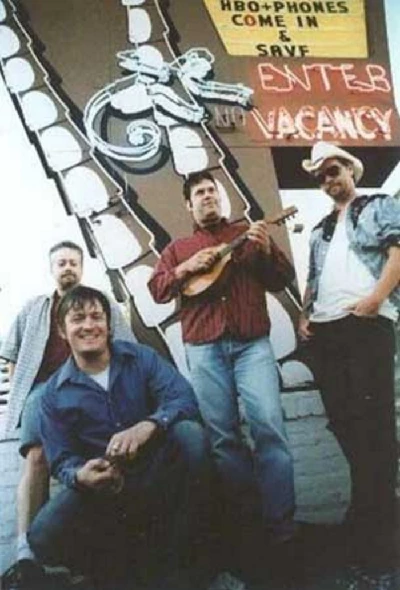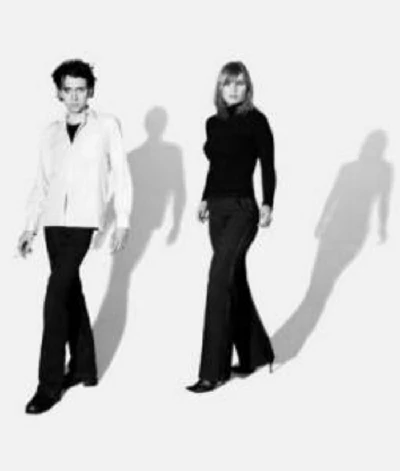published: 20 /
8 /
2005
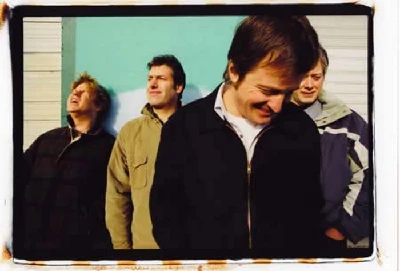
Since the success of their last album 'Post to Wire', alt rockers Richmond Fontaine have had a hectic touring schedule. Back for a third interview with Pennyblackmusic, they talk to John Clarkson about it and their new record 'The Fitzgerald'
Article
It has been a particularly hectic two days in what has been a whirlwind a year and half for Richmond Fontaine. They flew in overnight from their native city of Portland in Oregon to London yesterday, and have flown on to Edinburgh today for what is the start of a seven day tour.
Most of the members of the group are jetlagged, their body clocks not having yet adjusted amidst their frantic schedule to an eight hour time swap. Backstage at the Edinburgh Venue, forty minutes before they are due on stage, guitarist Dan Eccles sleeps sitting on the floor, his head hunched forward onto his knees. Drummer Sean Oldham is still awake, but craggy-eyed and drowsy. He tranquilly keeps half smiling at the brief lull in activity, content for bassist Dave Harding and vocalist Willy Vlautin, the group’s founders and spokesmen, to do the talking in what is Pennyblackmusic’s third interview with the band.
The bear-like Harding is polite, amiable, but also visibly tired, a worn and still presence, drifting hazily in and out of the conversation, and it is only Vlautin, who sits on the faded couch beside him, whom all the travel of the last 48 hours seems to have washed over. He is throughout the interview animated and lively , laughing a lot, his hands occasionally flicking and wringing out gestures as he enthusiastically talks about Richmond Fontaine’s latest album, ‘The Fitzgerald’ and his soon-to-be-published debut novel, ‘The Motel World’.
Richmond Fontaine pull themselves up from their tiredness to play a forceful, well-received 80 minute set to a capacity crowd, which consists of songs from all six of their studio albums to date, ‘Safety’ (1996) , ‘Miles From’ (1997), ‘Lost Son’ (1999), ‘Winnemucca’ (2002), ‘Post to Wire’ (2004) and ‘The Fitzgerald’ (2005). The first two came out on local Portland label Cavity Search ; the latter four have all been released by the band on their own El Cortez Records.
When they return to the stage for two ecstatically-received encores, Richmond Fontaine seem genuinely appreciative of their audience’s enthusiasm. Eccles takes snaps of the crowd with a Polaroid camera which he has left resting throughout the set on his guitar amp. Vlautin is bashful, almost shy as he thanks fans for turning out in such good number. Both Harding and Oldham are unable to stop grinning.
One, however, senses that Richmond Fontaine for all their bonhomie and good spirits on stage are suffering more than jetlag, that, in contrast to their previous show in Edinburgh and ever first Scottish date last September when they seemed simply gently bemused at being over in Britain at all, they are completely burnt out. As they hint in the interview, they are exhausted and are desperately in need of a break.
In the time since Pennyblackmusic last spoke to Vlautin and Harding in March 2005 just prior to the release of ‘Post to Wire’, the band haven’t stopped working.
At about the same time they gave that interview to Pennyblackmusic, a friend, doing some PR work in Britain for the group, sent a copy of ‘Post to Wire’ to the popular national music monthly, ‘Uncut.’ Its editor, Allan Jones, who had never heard of Richmond Fontaine before, seized upon it when it landed on his desk, instantly falling in love with the Reno-born and raised Vlautin’s semi-autobiographical blue collar tales of lives on the edge ; the exquisite, atmospheric pedal steel of the group’s fifth member Paul Brainard (who has absented himself from this string of dates to tour with his other band, the Sadies), and the band's rousing country rock melodies.
‘Post to Wire’ became Uncut’s Album of the Month in May 2004, and Richmond Fontaine found themselves instantly thrust, almost a decade after they first formed, from being a band little known outside the immediate province of America’s West Coast to a sudden international concern. As ‘Uncut’, who recently said in their 100th anniversary edition that “Richmond Fontaine may just be Uncut’s favourite band in the world right now” have continued to champion the band, making ‘The Fitzgerald’ another Album of the Month in June 2005, the group have started to tour Europe regularly. This tour, which will conclude with dates both in London and a high-on-the-bill slot at the Guilfest festival, is their fourth overseas visit in little over a year. They have continued to play dates up and down the West Coast also, where they maintain a regular fanbase, and have found time too to record ‘Obliteration by Time’, a mail order and tour only CD, which consists of re-recordings of songs from their first two albums. Mid 2005 finds them, all their years of hard work and graft having finally paid off, blazing high and at the top of their game.
A telling moment comes at the end of the interview when Vlautin, Harding and Oldham all offer to sign my copy of ‘The Fitzgerald’. Harding moves to wake Eccles out of his sleep to get him also to sign the CD.
“Oh no, man” Harding says when I protest, “He would hate to miss out on a second of this”, capturing in an instant the whole paradox of their situation, a band delighted but still startled at the whole suddenness of their success, keen to please and enjoying every moment of it, but at the same combat fatigued and knowing soon that they at least temporarily will have to stop.
‘The Fitzgerald’, which was recorded in early 2004 just prior to the release of ‘Post to Wire’, represents a change of direction for Richmond Fontaine. Stripped down, sparse, the band have, like Bruce Springsteen with his classic ‘Nebraska’ album, removed themselves of their rock ‘n’ roll roots, and created what is essentially a folk record. The haunting, majestic melodies that have made Richmond Fontaine such a compelling presence in the past are still there, but, subtle and acoustic, are softer and more delicate, and one has to listen harder to find them.
While many of the characters in ‘Winnemucca’ and ‘Post to Wire’ were able to find redemption in each other and through love, ‘The Fitzgerald’, a far more bleak offering, is also Richmond Fontaine’s darkest album since ‘Lost Son’. ‘Black Road’, one of the early tracks on the album, finds Vlautin spiralling into the deepest depression in his hotel room while drunks fight in the street otuside. It paves the way for much of the rest of the record.
On ‘The Incident at Conklin Creek’ a father and son out in the desert find the murdered body of a boy still in his teens, while the narrator of ‘Exit 194B’ and his cousin have to deal with the sudden death of his younger brother. A battered wife finds love with the character of the title in ‘The Janitor’ in the hospital in which her husband has put her, but when they try to run away together she starts to cough up blood. A girl suffering with panic attacks on ‘Don’t Look and It Won’t Hurt’ meanwhile tries to escape her violent boyfriend by moving to a town in which no one knows her. Only the characters on the last song ‘Making It Back’, drunk and finding comfort with each in the after hours, are happy.
It is an album that is so starkly uncompromising and so far removed from the band’s more colourful other work that it is initially hard to understand, but one which grows and becomes more compelling with each new hearing, and is a record that one gets the impression that Richmond Fontaine are especially proud of.
PB : The album is named after The Fitzgerald Hotel, the place in Reno where you wrote much of the album, Willy. You conjure up it in it a world of alcoholics, wife abusers, degenerates, bookies who beat their customers up and out-of-luck criminals. What kind of neighbourhood is it in ? Is it fairly rough ?
WV The Fitzgerald Hotel is a down town casino. It’s not in a poor part of town by any means. It is next to two other closed casinos and the area it is in has been rough in the past, but it’s doing much better now. Reno has really made a turnaround. The economy is really good there. I have been in Portland for ten years now, so I am kind of stuck in time a little. People have, however, been moving to Reno in droves for the last decade. When I left there, there were approximately 200, 000 people in the whole area, but it’s almost doubled that now.
The casino itself looks inside like something from the 50’s. The rooms there only cost $28 a night. On one side of it there are some railroad tracks. As trains go by all the time, they can never charge more than $28, but at the same time it is safe. You can leave your guitars there. It’s the kind of place where from Sunday to Thursday you can stay there for $130 or £15 a night. I have never won when I have gambled there in the entire time I have been going (Laughs), but it’s a pretty nice place.
PB : The last two albums showcased Paul Brainard’s pedal steel in particular. This album in contrast is a much starker album. It could be described as an album of guitar and voice. Would you agree with that ?
WV : Yeah, definitely. When we started rehearsing the record, we had pedal steel on it but it just made the record too dreamy and we felt that it took away from the lyrics. As the lyrics were already pretty stark, we didn’t want to lose track of them, so we made the decision not to have any pedal steel at all. It was a decision that we felt was right for the songs.
DH : The songs are basically folk songs. We didn’t want to put too much rock ‘n’ roll on top of them. It would get in the way of words, so we took it easy and did them without the bash and crash that we normally do.
WV : JD Foster, our producer, was good in that sense. Everyone was committed to making this little stark record and then as we progressed Dave and I started getting nervous (Laughs). Every time we would say “Maybe we should have some pedal steel after all ”, he would talk us down. He would say “No, stick with it. This is probably not going to be the most successful record you do, but you’ve got to commit to it if you are going to do it.”
I had always been a fan of those records like ‘Nebraska.’ I had always wanted to make a record like that and every time I got nervous he would talk me out of it. He will talk to you about what you want and then if you get scared the he’ll talk you out of it. He would say “It’s a folk record. Don’t worry if it is too stark.”
He’s a really nice guy. I love hanging out with him just as a friend. He is really smart and he’s also really laidback which is good for us. He doesn’t get too serious about anything and that seems to help us the general cause.
PB : Dave, you play upright bass on some of the tracks. Was that a new experience to you ?
DH : It is pretty new. On ‘Winnemucca’ I played it on one song ‘Santiago’, but I haven’t played a lot of upright bass. I have got to put tape on the fret board so that I know where the notes are (Laughs).
PB : Willy, you said at the time of Pennyblackmusic’s first interview with you at the end of 2001 that when you did the ‘Lost Son’ album, which is a really dark record, that you scared yourself with your own blackness, and that you wanted to wean yourself away from that. You, therefore, did ‘Winnemucca’ which was less black. ‘Post to Wire’ was less dark as well. This album, especially in its first half, returns to the darkness of ‘Lost Son’. Were you in an especially negative frame of mind when you wrote that record ?
WV : Not really ! No ! (Laughs). ‘The Fitzgerald’ was a really cool record for me to make. We worked really hard as a band together on ‘Post to Wire’ and all put pressure on ourselves to make a record that wasn’t so dark, but which was also a good record that people would like and which would also help the band. With ‘The Fitzgerald’ I decided to let myself be myself. It was a really fun record for me to write, because I figured we had already done the work on ‘Post to Wire’, so I could relax and write folk songs and not worry about choruses and chill out a bit.
PB : ‘Exit 194B’ has got a real sense of mystery to it. There is so much left unexplained in that song, such as how did the younger brother die ? Why has the cousin who has joined run away from it ? Who was the woman he picks up before he goes off ? Was that intentional ?
WV : Yeah, it was. I like sometimes to keep things open. I lived with these two guys in a house off Exit 194B, which is in Springfield in Oregon. We had a really good time getting drunk together. We were just kids. We must have been about 21. The inspiration for that song came from that.
One of my friends died three years later. It was a tragic death. He killed himself. My other friend and I couldn’t stop thinking about him after that. Every time we were together we would start drinking and thinking about him and this went on for years. We didn’t live in the same town at the time, but every time we saw each other we would bond with this real kind of dark sadness about our friend.
I was thinking about that when I wrote ‘Exit 194B’. When the little brother dies, the other two guys are left with just too many memories. I figured the cousin in it is really dark about it, and then he thinks that he has found a solution to it. He will join the army. It will straighten him up, get him feeling right again and he cheers up, starts partying and finds a girl, and then he wakes up from that maybe six months later and he goes AWOL. Joining the army has not been the right decision. He is a lost guy. He’s come back to that same house and he’s again fallen into that sadness you do when you miss somebody.
PB : Where did you get the inspiration for ‘The Incident at Conklin Creek’?
WV : I used to go camping every year. In Nevada there are lots of mines. One time my mom’s boyfriend and I were hiking and we were pretty far away from anywhere. We are talking 50 miles from the nearest town. No one else was around. We were on this dirt road and there was this big old abandoned mine from sometime in the 1800’s just off it. We walked up to it to check it out and there was a pair of women’s underwear and a shoe there.
There was nothing else, but you start thinking. My mind always tends to think the worst. You don’t think about some High School kid and his girl out there. You’re camping and you think “This is where I am not supposed to be afraid of man and the horrible things people do to each other.” Although it is a kind of bonding experience for the father and son, it also installs in them a sense of fear. Nothing’s safe. You’re not even safe out in the woods.
PB : It seems that a lot of your lyrics are basically manifestations of the truth. You pick up something on you see. Maybe it frightens you, and then you change it a little.
WV : I totally polarise it. Yeah ! I’ll change it to fit the story, and I’ll give it weight. I do polarise things that aren’t a very big deal and I’ll make them a huge deal. That’s one of the things in writing which I enjoy and find interesting.
PB : It is, however, an album that, which for all its darkness, lightens as it progresses. The last three songs all offer hope to some vague degree. You don’t know how long the couple in ‘The Janitor’ have together, but at least they have each other temporarily. The woman in ‘Don’t Look and It Won’t Hurt’ faces an uncertain future in a new town, but she at last got away from her abusive boyfriend. ‘Making it Back’ is meanwhile very redemptive. The couple in it are drunk, but they have found comfort in each other. Was it important to you to end the album on an optimistic note ?
WV : A lot of the time I think the characters in my songs are going to end up a lot better than most people do. With ‘The Janitor’ I definitely think the best and that the couple in it have both got lucky.
PB : She is coughing up blood. Does that mean then that she is not necessarily going to die ?
WV : No, she won’t die. I put that in because she is going to have to face up to things. She can’t just run. They are going to have to go back. She is going to have to go back to the hospital and face up to her husband, but hopefully she will be strong enough to get away this time. Maybe she will latch onto this guy, the janitor. Maybe he isn’t a bad guy. Maybe he is an alright guy. I think that he is. On that level I have more optimism than those characters.
I always am interested in someone, like the girl in ‘Don’t Look and It Won’t Hurt’, who has the strength to get out of a bad situation. To get out of a situation and to stay out of it are, however, two different things. You hope that someone has the courage left after they make the break from a bad situation-drinking, a troubled relationship, their life being in a dead end or whatever-to stay away from it.
It’s really hard for that girl, because she’s in a new town and she doesn’t know anybody. She has got no support at all and she has got bad anxieties, so you just hope that she is going to remain strong enough not to fall back and to call the guy one night when she is lonely. There were times when the guy was probably really nice to her, so she might just forget about all of the bad, start calling him up and it might start up all over again. With her, I don’t know if she ends up alright.
I definitely wanted ‘Making It Back’ to be the last song on ‘The Fitzgerald.’ I felt that whole record was on a black road. That’s why we put that song ‘Black Road’ near the start. All the stories on the album end up going down a dark road in your mind. As ‘Making It Back’ comes at the end, and the couple in it are happy, they may, however, all come out better than you think. You can relax a little.
PB : You’ve just released another album ‘Obliteration by Time’, which you describe as “new recordings of old favourites.” It consists largely of re-recordings of songs from the first two albums. Why did you decide to re-record those tracks ? Was that because those first two albums are still owned by your previous record company ?
DH : Those first two records are very hard for us to get a hold of, let alone other people (Laughs). The band doesn’t own them. That was the main impetus for doing it.
WV : We wanted to stake a claim to them too, so we would have them. We have a pretty fair representation of all our records now, and we are in control of them which is really exciting.
DH : The band is also very different from what it was. Willy and I are the only original members left. ‘Obliteration by Time’ features our present line-up. For me it was a real treat to have songs that I had been playing for seven, eight, nine years and to actually get to record them again. It was like Christmas.
PB : Do you think they sound radically different ?
DH : Not radically. Our playing is so much better though.
WV : We’ve tried to keep within the spirit of the songs. We just sell ‘Obliteration by Time’ at shows.
PB : There are some songs that you haven’t recorded before there also. There is one called ‘Song for Dead Moon.’ Who are Dead Moon ?
WV : They are a three piece garage rock band out of Portland. They’ve been together since I think 1977 and they’re a total inspiration. It features a husband and wife on vocals. They sing love songs to each other. They sound like AC/DC I guess, a garage rock AC/DC. Frank Cole, the songwriter, writes perfect songs. Any time you start getting down or jaded by rock ‘n’roll, you can go and see Dead Moon and they will make you want to be in a band again. They totally restore your faith.
PB : You’ve also got a cover of a Husker Du song, ‘Pink Turns to Blue’, on ‘Obliteration by Time.’
WV : Dave sings that one.
DH : That was a blast. It was the first time I got to sing lead on one of our records. It was a little scary, but it was a lot of fun.
WV : It came out good.
DH : It was one we had done from time and time over the years. We would play it sometimes at gigs. We had three and a half minutes left of tape, and we went out for dinner and decided to do a Husker Du song to finish off the tape. It seemed to fit the rest of the record.
PB : You have become much better known in Britain since Pennyblackmusic last talked to you a year and a half ago. You’ve been self-managing yourselves for a long while now. You said at that last interview that you base work and jobs around the band. Things will have become a lot busier for you. Has it become harder to find the time for writing and working on songs ?
WV : We don’t have a lot of time to rehearse songs. I’ll write songs, but I don’t have the time I used to. It usually takes me a couple of weeks to get it back into my head after touring.
DH : We had a couple of tours offered to us in August and September, but we decided not to take them and to decline them so that we could have some time off and also work on some new materials.
PB : How many of you guys have families ?
WV : He’s married (Pointing at Sean Oldham). The rest of us have girlfriends.
PB : When Pennyblackmusic last spoke to you, you were planning to record an album in Tucson in Arizona. Has that happened yet ?
DH : We’re going to do that in January.
PB : What direction will that take ?
WV : I don’t know yet. I have some ideas.
DH : I think we’re going to soak up the vibe and take that to Tucson.
PB : Who’s going to be the producer on it?
WV : JD is going to produce it. He told us that if we went Tucson he would do it, so we were like “Alright, we’ll go to Tucson.” JD was really keen to go to Tucson because it is beautiful down there. Even though it is winter it will be really hot.
DH : He’ll get out of New York where he comes from and we’ll get out of Portland. It should be good.
WV : We have the songs. We just have to work at them now and hopefully it will turn out alright.
PB : Willy, Faber and Faber are also about to publish your first novel, ‘The Motel Life.’
WV : Yeah, it’s coming out in April .
PB : What’s it about ?
WV : It’s kind of like listening to a Willy Vlautin song. It’s about these two brothers. They live in a motel in Reno by themselves. They’re 17 and 15, and it describes their life. The story starts when they are in their 20’s, but it goes back and tells the story of how they have got to where they are.
PB : That must be a really exciting development for you,
WV : Oh man, beside the band, it’s the most exciting thing that has ever happened to me. I can’t quite believe my luck. It’s like I have hit the lottery. I really hope people like it because my favourite thing to do is to write.
PB : Have you got other novels planned ? Are you planning to publish any other novels ?
WV : If they will take them. I’ve got a whole stack of stories. There’s nothing planned though at this stage. Things are so competitive that if it doesn’t do well I won’t get another published.
PB : How did you become involved with Faber and Faber ?
WV : They’re really nice. I am good friends with a novelist in London called Stav Sherez. I met him through the band. He wrote a book called ‘Devil’s Playground’ and writes crime novels. He is a really good writer. We became friends, and then I met his agent, and then she asked to see my book which was really nice. She took me on as a client and sold it. I was really lucky.
I have been into Faber and Faber’s now a few times. You go in there and there are all these books that they have published. You’re like “Can I have that?” (Laughs) and it’s pretty fun because you get a lot of free books. I didn’t know what to expect in there at all, but they’re pretty friendly.
PB : You’re going to be doing the album in January. What have you got planned for the future ? What comes next ?
WV : Hopefully that record will turn out good and then we’ll probably have some time off and then we’ll start touring that on.
PB : Are you hoping to come back over to Britain soon?
DH : I hope so.
WV : I hope that we get invited. I am sure that we will. That would be a lot fun.
PB : It’s been a really good year and half for you, hasn’t it ?
WV : Yeah, things have been getting better us for us. Hopefully things will last for a couple of more years yet.
PB : Thank you both for your time.
Band Links:-
http://richmondfontaine.com/
https://www.facebook.com/Richmond-Font
https://twitter.com/rffontaine
Have a Listen:-
Picture Gallery:-
